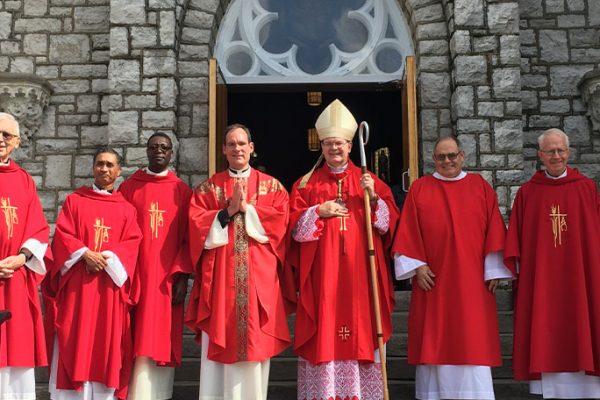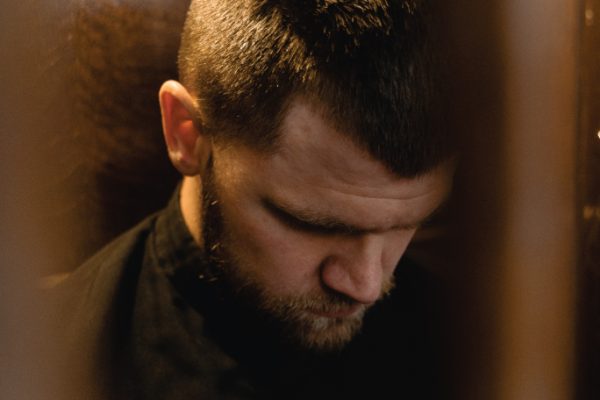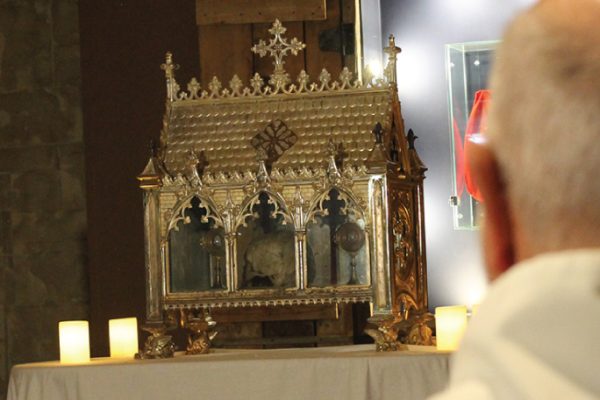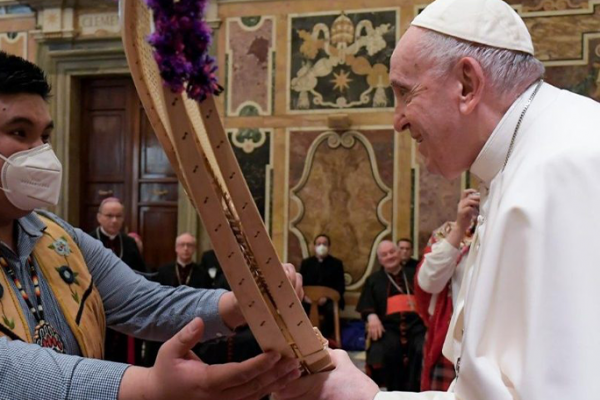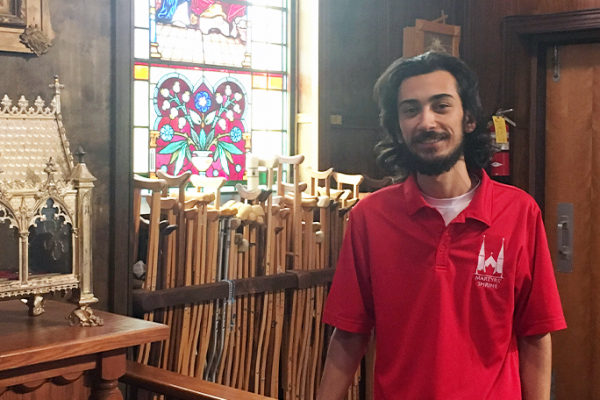-
Visiting Clergy
Notice for Priests Visiting priests are welcome to concelebrate with us in the Church of St. Joseph. Priests may also celebrate individually, or with a group, by advance reservation, and pending availability. A letter of good standing required. To schedule a Mass for an individual or a group, please contact us at info@martyrs-shrine.com or call us toll free at 1-855-526-3788. Stay With Us The Magis Guesthouse at Martyrs' Shrine offers convenient and affordable accommodation for all visiting Jesuits, religious, and diocesan clergy. The Magis offers a serene and secure environment to relax, unwind or work. The Magis is not currently available to the general public.
Continue reading -
Sacrament of Reconciliation
What is the Sacrament of Reconciliation? The Sacrament of Reconciliation, also commonly called the Sacrament of Penance or Confession, is one of the seven sacraments of the Catholic Church (known in Eastern Christianity as sacred mysteries), in which the faithful are absolved from sins committed after baptism and reconciled with the Christian community. During reconciliation mortal sins must be confessed and venial sins may be confessed for devotional reasons. According to the dogma and unchanging practice of the church, only those ordained as priests may grant absolution. Confessionals at Martyrs' Shrine The confessionals are located next to the main entrance of the Shrine Church and are available on a first-come, first-served basis. Hours are 9:00am-4:00pm with the exception of noon hour when the fathers retreat to the residence for lunch. Steps of Forgiveness Every time we sin, we hurt ourselves, other people and God. In Reconciliation, we acknowledge our sins before God and His Church (confession). We express our sorrow in a meaningful way (contrition), receive the forgiveness of Christ and His Church (absolution), make reparation for what we have done and resolve to do better in the future (penance). The forgiveness of sins involves four parts: CONTRITION: A sincere sorrow for having offended God, and the most important act of the penitent. There can be no forgiveness of sin if we do not have sorrow and a firm resolve not to repeat our sin. CONFESSION: Confronting our sins in a profound way to God by speaking about them —aloud— to the priest. PENANCE: An important part of our healing is the “penance” the priest imposes in reparation for our sins. ABSOLUTION: The priest speaks the words by which “God, the Father of Mercies” reconciles a sinner to Himself through the merits of the Cross. Before Confession The Sacrament of Reconciliation does require preparation. We should begin with prayer, placing ourselves in the presence of God who is loving and merciful; reflecting on Jesus who is the healer who reaches out in love; and seek the help of the Holy Spirit in examining our lives. We review our lives since the last time we received the sacrament, searching our thoughts, words and actions for that which did not conform to God's command to love Him and one another through His laws and the laws of His Church. This is called an examination of conscience. To Make an Examination of Conscience Begin with prayer Review your life with the help of some questions (see some examples in the sidebar) Tell God how truly sorry you are for your sins Make a firm resolution not to sin again Rite of Reconciliation Reconciliation may be face-to-face or anonymous, with a screen between you and the priest. Choose the option that is the most comfortable for you. The priest gives you a blessing or greeting. He may share a brief Scripture passage. Make the Sign of the Cross and say: “Bless me father, for I have sinned. My last confession was…” (give the number of weeks, months or years). Confess all of your sins to the priest. The priest will help you to make a good confession. If you are unsure about how to confess or you feel uneasy, just ask him to help you. Answer his questions without hiding anything out of fear or shame. Place your trust in God, a merciful Father who wants to forgive you. Following your confession of sins, say: “I am sorry for these and all of my sins.” The priest assigns you a penance and offers advice to help you be a better Catholic. Say an Act of Contrition, expressing your sorrow for your sins. The priest, acting in the person of Christ, then absolves you from your sins. After Confession Rejoice! You have received the forgiveness of Christ! What should you do when you leave? Remember the words you recited in the Act of Contrition: “I firmly intend, with your help, to do penance, to sin no more, and to avoid whatever leads me to sin.” Before you leave the confessional, the priest will give you your penance, which may consist of prayer, an offering, works of mercy or sacrifices. These works help to join us with Christ, who alone died for us. The goal of our life’s journey is to grow closer to God. We can do this through prayer, spiritual reading, fasting and the reception of the Sacraments.
Continue reading -
Novena
What is a Novena? A novena (from Latin: novem, "nine") is an ancient tradition of devotional praying in Christianity, consisting of private or public prayers repeated for nine successive days or weeks. The nine days between the Feast of the Ascension and Pentecost, when the disciples gathered in the upper room and devoted themselves to prayer, is often considered to be the first novena. In some Christian communities, such as in Africa, Latin America and the Philippines, novena traditions are popular and include devotional rituals such as congregational prayers, the decoration of statues, hymn singing with music, as well as community fiesta events over beverages, refreshments or processions. Novenas are most often prayed by members of the Roman Catholic Church, but also by Lutherans, Anglicans, and Eastern Orthodox Christians; they have been used in ecumenical Christian settings as well. The prayers are often derived from devotional prayer books, or consist of the recitation of the rosary (a "rosary novena"), or of short prayers through the day. Novena prayers are customarily printed in small booklets, and the novena is often dedicated to a specific angel, saint, Marian title of the Blessed Virgin Mary, or one of the persons of the Holy Trinity. Martyrs' Shrine Feast Days Novenas are a type of devotion that is often done in preparation for a feast day or saint's day. It is a period of reflection that includes prayers of petition, intercession, meditation and thanksgiving. At Martyrs' Shrine, we celebrate two novenas each year that are closely related to our story. In the spring we celebrate the novena and feast day of St. Joseph, patron saint of martyrs and of Canada and whose name the Shrine Church was dedicated towards. In the autumn we celebrate the novena and feast day of the Canadian Martyrs whom the entire Shrine is dedicated towards. Other feast days celebrated through the rest of the year are described on our Events Calendar. Full Novena Booklet for The Canadian Martyrs Full Novena Booklet for St. Joseph
Continue reading -
Praying for Residential Schools
On April 1, 2022 at the Vatican, in an address to representatives of Indigenous Peoples in…
Continue reading -
Answering the Call To Be Here, Now, With Him.
Christopher Spiegel was born in London, Ontario, and grew up in Florida. He is currently discerning a vocation to the Society of Jesus, Canada Province, and will be staying…
Continue reading -
From the Gate Looking Out
What I’ve learned from my time at Martyrs’ Shrine I’d like to start with a surprising (or perhaps not surprising) fact, the Church here at the Martyrs’ Shrine isn’t a…
Continue reading -
Reflection of Your Purpose
In our generation today, an average life span of a person is 75 – 80 years old. Imagine that you are now 35 years old, how do you plan…
Continue reading -
A Look Into the Shrine Gift Shop
On the surface, the Gift Shop would appear to be just that – a place to purchase religious items for one’s self, and gifts for another. Scratch the surface,…
Continue reading -
Spiritual Exercises and Corporate Leadership
A fundamental component of Jesuit Spirituality or, often called, Ignatius Spirituality, is the Spiritual Exercises. These exercises were developed by the founder of the Society of Jesus, St. Ignatius…
Continue reading -
Solemnity of Pentecost
‘The Spirit of the Lord has filled the whole world and that which contains all things understands what is said, alleluia.’ Are the words of the entrance antiphon, and…
Continue reading
- 1
- 2

